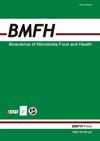Fucosylated human milk oligosaccharide-utilizing bifidobacteria regulate the gut organic acid profile of infants
IF 2.9
4区 医学
Q2 Agricultural and Biological Sciences
引用次数: 0
Abstract
Bifidobacteria are the predominant bacteria in the infant gut and have beneficial effects on host physiology. Infant cohort studies have demonstrated that a higher abundance of bifidobacteria in the gut is associated with a reduced risk of disease. Recently, bifidobacteria-derived metabolites, such as organic acid, have been suggested to play crucial roles in host physiology. This review focuses on an investigation of longitudinal changes in the gut microbiota and organic acid concentrations over 2 years of life in 12 Japanese infants and aims to identify bifidobacteria that contribute to the production of organic acid in healthy infants. Acetate, lactate, and formate, which are rarely observed in adults, are characteristically observed during breast-fed infancy. Bifidobacterium longum subspecies infantis and the symbiosis of Bifidobacterium bifidum and Bifidobacterium breve efficiently produce these organic acids through metabolization of human milk oligosaccharide (HMO) with different strategies. These findings confirmed that HMO-utilizing bifidobacteria play an important role in regulating the gut organic acid profiles of infants.利用双歧杆菌调节婴儿肠道有机酸谱的集中人乳寡糖
双歧杆菌是婴儿肠道中的主要细菌,对宿主生理有有益的影响。婴儿队列研究表明,肠道中双歧杆菌的丰度较高与疾病风险降低有关。最近,双歧杆菌衍生的代谢物,如有机酸,被认为在宿主生理中起着至关重要的作用。这篇综述的重点是对12名日本婴儿2岁以上肠道菌群和有机酸浓度的纵向变化进行调查,旨在确定双歧杆菌在健康婴儿中促进有机酸的产生。醋酸盐、乳酸盐和甲酸盐,在成人中很少观察到,但在母乳喂养的婴儿中观察到。长双歧杆菌亚种婴儿和两歧双歧杆菌和短双歧杆菌的共生通过代谢人乳寡糖(HMO)的不同策略有效地产生这些有机酸。这些发现证实,利用hmo的双歧杆菌在调节婴儿肠道有机酸谱中起重要作用。
本文章由计算机程序翻译,如有差异,请以英文原文为准。
求助全文
约1分钟内获得全文
求助全文
来源期刊

Bioscience of Microbiota, Food and Health
Immunology and Microbiology-Applied Microbiology and Biotechnology
CiteScore
5.50
自引率
3.20%
发文量
24
期刊介绍:
Bioscience of Microbiota, Food and Health (BMFH) is a peer-reviewed scientific journal with a specific area of focus: intestinal microbiota of human and animals, lactic acid bacteria (LAB) and food immunology and food function. BMFH contains Full papers, Notes, Reviews and Letters to the editor in all areas dealing with intestinal microbiota, LAB and food immunology and food function. BMFH takes a multidisciplinary approach and focuses on a broad spectrum of issues.
 求助内容:
求助内容: 应助结果提醒方式:
应助结果提醒方式:


